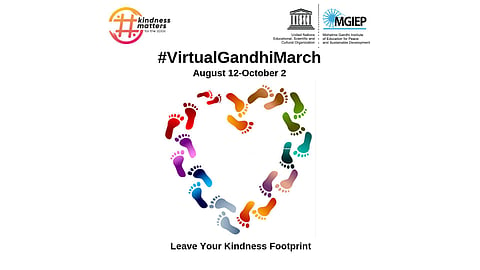

UNESCO Mahatma Gandhi Institute of Education for Peace and Sustainable Development (MGIEP) is following Gandhi's footsteps to sensitise the youth about kindness and take a step closer to achieving world peace. The institute kickstarted #VirtualGandhiMarch, a social media campaign to mobilise the youth to share their stories of kindness, earlier this month.
The #VirtualGandhiMarch started on UN International Youth Day, August 12, 2019, and will run until the International Day of Non-Violence and Mahatma Gandhi’s 150th birth anniversary on October 2, 2019. The virtual march is part of a wider mission, #KindnessMatters for the Sustainable Development Goals (SDGs), a first-of-its-kind international youth campaign on kindness with the goal of mobilizing the world’s youth to achieve the 17 SDGs through transformative acts of kindness, compassion, care towards self, others and the environment.
Be Kind and Carry On
The #KindnessMatters campaign has till now generated more than 5,000 youth stories from over 54 countries. The second phase from the year 2020 onwards will mobilise the UN Member States to declare an International Decade of Kindness."In a world full of rising intolerance, apathy, indifference, social exclusion, fear, gender-based violence, climate change and extremism, we believe that apart from catering to students’ academic needs, it is equally important to hone their social and emotional capabilities to nurture rational, empathetic and compassionate citizens," said Dr Anantha Duraiappah, Director, UNESCO MGIEP. "#VirtualGandhiMarch provides a platform for young people and youth-driven organisations to share positive stories of change, highlighting the powerful forces of compassion, care and kindness. The campaign is youth-centric but does not exclude non-youth participants from sharing their stories," he added.
The campaign aspires to provide “agency and opportunity” to youth who feel alienated by the strict, traditional rules and structures that exclude them from the decision-making forums and the design and implementation of policies that directly affect their lives. "There’s nothing stopping the youth of India from connecting with the youth of China or Nigeria to achieve the 17 sustainable development goals. The youth will share stories and best practices of what happened for their unique on-the-ground circumstances, how they mobilised and formed very large vocal and active groups, raised crowd-sourced funds, and made positive changes in their communities right up to their continents or globally," added the Director. "Ultimately, the youth will create the Vasudhaiva Kutumbakam."
Dr Duraiappah stated that research has also proven that practising kindness can be a transformative process. "The need of the hour is to foster an environment of giving. The #KindnessMatters campaign draws from research in the neurosciences, which has clearly demonstrated the benefits of kindness not only for recipients but also for providers," the professor added. "The global #KindnessMatters campaign is especially targeted at youth between 18 – 35 years old. They are digital natives with unprecedented access to information and opportunities – we hope the Campaign stories will excite and motivate the youth to either share their equally inspiring stories and pass on a challenge to their large networks of followers to do the same," he explained.
Dear Gandhi
If real societal change is to be achieved, Dr Duraiappah feels, Gandhi’s learnings, which he meticulously imbibed through his experiments, need to be built into our education systems and exemplified in our daily lives. Skills such as empathy, mindfulness, impulse control, kindness and criticality, can be built through constant experimentation and experience, the same key pathways that Gandhi himself deployed to build and ultimately embody them.
Though the centrality of education, like non-violence, is almost conclusive, the type of education that is necessary for peace is what has never been addressed in any serious manner, said Dr Duraiappah and added, "There is a need for education not as the usual intellectual exercise of regurgitation but a journey through self – of building peace first with the self, before the society. Education that is aligned with neurobiological development and aimed at nourishing the whole person."
The answer is in your genes
Educators need to take into account that youth transitioning from childhood, have greater social exposure leading to awareness and mental maturity as well as vulnerabilities such as an appetite for risk and novelty and a search for meaning and purpose. Studies have also shown that youth are better at developing several cognitive empathetic skills such as sensing other’s needs and concerns, understanding complex social dynamics and situations, and voluntarily performing prosocial acts. In short, adolescence, the time when neuroplasticity is at its peak, is a significant time to create a long-lasting positive impact among the youth.
Fortunately, Dr Duraiappah added, science has improved considerably and unlike a century ago, we now understand the neurobiological basis of learning; and an education that explicitly builds social and emotional competencies as possible. "There is also an understanding that to act — non-violently and with kindness — to solve contemporary societal problems requires emotional resonance. Like Gandhi's, this too is an arduous journey of self before society. A constant meticulous process of criticality, self-reflection, self-compassion, impulse control, and emotional regulation; of first becoming the change that one wishes to see in the world, of finding peace within self before expecting and effecting it in the world. It has to be this way — else, it is futile for a self at war to search for peace in the world," he said.
But this is not it. As part of the larger #KindnessMatters for SDGs campaign, the UNESCO MGIEP is organising the first-ever ‘World Youth Conference on Kindness’. The theme of the conference is 'Vasudhaiva Kutumbakam: Gandhi for the Contemporary World: Celebrating the 150th birth anniversary of Mahatma Gandhi’. Participation in the main event of the conference (August 23, 2019, at the Vigyan Bhavan) is free for the youth and those interested can register from the MGIEP website.
